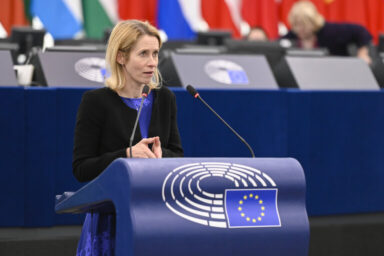The European Commission has rolled out its 2030 consumer agenda — a five-year plan to modernise Europe’s consumer rules for a marketplace that is increasingly digital, increasingly global, and increasingly strained by rising living costs. From a forthcoming Digital Fairness Act to a crackdown on unsafe products, the EU is aiming to lower prices, boost trust, and reinforce protections for the bloc’s 450 million consumers.
The European Commission has rolled out its 2030 consumer agenda — a five-year plan to modernise Europe’s consumer rules for a marketplace that is increasingly digital, global, and strained by rising living costs. From a forthcoming Digital Fairness Act to a crackdown on unsafe products, the EU aims to lower prices, boost trust, and reinforce protections for the bloc’s 450 million consumers.
New and improved
Positioned by officials as the EU’s next wide-ranging update to consumer policy — broader in scope than previous omnibus-style reforms — the agenda serves as a strategic roadmap for the next wave of legislation rather than a single directive. The commissioner explained on Wednesday why improved consumer rules were so important:
“Consumer spending now represents 51 per cent of the EU’s GDP, so consumer spending is the largest component of the European economy. And we know that confident consumers mean a healthy and dynamic economy for our single market.”
At the centre of the agenda, Mr McGrath said, are challenges the new framework aims to tackle — including a “surge” in unfair online commercial practices, the continued boom in e-commerce, persistent barriers to cross-border goods and services, the high cost of living, and the impact of climate change.
You might be interested
Seamless
To address these issues, the Commission plans to complete a more seamless Single Market for consumers, reducing costs for households, improving mobility, and expanding access to cross-border financial services.
Second, Brussels intends to introduce a Digital Fairness Act, which the Commission plans to propose in 2026. The DFA is envisioned as a major reform targeting manipulative or harmful online practices — particularly those affecting children. Alongside this, the Commission wants to simplify business rules, reduce administrative burdens through digital tools, improve the clarity of consumer information, and intensify enforcement against online fraud.
The third pillar focuses on sustainable consumption. The agenda commits to supporting Member States in applying EU rules that encourage durable, repairable and greener products, while promoting second-hand markets, return schemes, and circular start-ups that keep goods in use for longer.
The final element strengthens protection against unsafe or non-compliant products sold online. Planned measures include reforming the Consumer Protection Cooperation framework, deepening enforcement of the General Product Safety Regulation, revising market-surveillance rules, and expanding cooperation with non-EU authorities to stop unsafe goods at the source.
A pivotal approach
Building on decades of consumer-rights legislation, the 2030 agenda replaces the 2020–2025 action plan and marks a pivot toward a more digitally resilient, economically fair, environmentally responsible, and safety-focused European marketplace. As a policy blueprint — rather than a standalone legislative package — it prepares the ground for the EU’s next major overhaul of consumer protections heading into 2030. Mr McGrath also stressed that “consumer competitiveness” underpins Europe’s competitiveness and growth, and said the new agenda would not only boost consumer confidence but also reduce administrative burdens.











